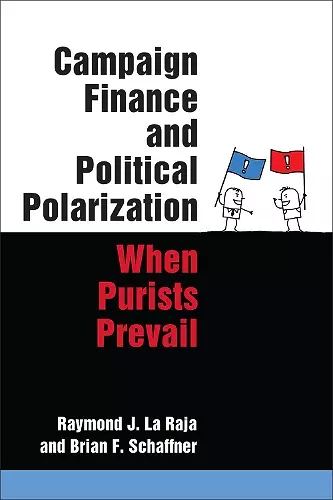Campaign Finance and Political Polarization
When Purists Prevail
Brian F Schaffner author Raymond J La Raja author
Format:Paperback
Publisher:The University of Michigan Press
Published:30th Oct '15
Currently unavailable, and unfortunately no date known when it will be back

Efforts to reform the U.S. campaign finance system typically focus on the corrupting influence of large contributions. Yet, as Raymond J. La Raja and Brian F. Schaffner argue, reforms aimed at cutting the flow of money into politics have unintentionally favored candidates with extreme ideological agendas and, consequently, fostered political polarization.
Drawing on data from 50 states and the U.S. Congress over 20 years, La Raja and Schaffner reveal that current rules allow wealthy ideological groups and donors to dominate the financing of political campaigns. In order to attract funding, candidates take uncompromising positions on key issues and, if elected, take their partisan views into the legislature. As a remedy, the authors propose that additional campaign money be channeled through party organizations—rather than directly to candidates—because these organizations tend to be less ideological than the activists who now provide the lion’s share of money to political candidates. Shifting campaign finance to parties would ease polarization by reducing the influence of “purist” donors with their rigid policy stances.
La Raja and Schaffner conclude the book with policy recommendations for campaign finance in the United States. They are among the few non-libertarians who argue that less regulation, particularly for political parties, may in fact improve the democratic process.
“Ray La Raja and Brian Schaffner have written an important book from a fresh research perspective that needs to be incorporated into all discussions of money in politics. From polarization to the proper role of the political parties, this book takes an extremely productive look at what is happening in the states and how that might serve as a laboratory for what works and what doesn’t in our elections.”—Benjamin L. Ginsberg, Partner, Jones Day; former counsel to RNC, the Mitt Romney campaign, and the Bush-Cheney campaigns
“As American politics has grown more polarized, more shrill, and more deadlocked, reformers have been treating it with horse-doctors’ doses of the wrong medicine—or so Ray La Raja and Brian Schaffner argue in this deeply researched, closely argued, and urgently important book. Instead, strengthening the role of parties and political professionals could begin restoring health to the body politic. This counterintuitive and compelling book will change the way you think.”—Jonathan Rauch, Senior Fellow, The Brookings Institution
“LaRaja and Schaffner's book upends conventional wisdom on money in politics. They demonstrate convincingly that our disfigured campaign funding system has led to the worst of all worlds: unlimited and unaccountable outside spending that polarizes our politics, alongside hamstrung political parties that would be in the best position to reign in extremists and create governing coalitions. The book is a must-read for anyone who cares about the mockery our campaign financing system has become.”—Nathaniel Persily, James B. McClatchy Professor of Law, Stanford Law School
""It might seem paradoxical that strengthening parties could actually reduce partisan polarization. But that is exactly the provocative argument that La Raja and Schaffner make. It is an argument worth taking seriously by anyone who wants to make American politics less divisive.”—John Sides, George Washington University
“I believe this book will be one of the more important contributions in the last decade to understanding the dynamics of political polarization in America today. Campaign Finance and Political Polarization is methodologically innovative and impressive in the data bases it uses to take advantage of the ‘natural’ comparative social science ‘experiment’ in the effects of campaign finance regulation on the legislative process that results from different regimes across the states.” —Rick Pildes, New York University
ISBN: 9780472052998
Dimensions: unknown
Weight: 318g
208 pages